 A marking, for each and all
A marking, for each and all
I.
She'd wake when he'd haul her from the comforter, his hands
at her throat, pinning her to the wall.
Orange—she spoke
one morning sipping o.j. by the sink
in the east-side window sunshine
as the fry pan sizzled with pork scent beside her—
his eyes always looked orange in the moonlight,
blood vessels pulsing like those
of the possum behind the shed that her daddy'd
pumped three rounds from a 12-gauge
into when she was a girl.
The plaster with so many
hard grains like beach sand
at her back and her choked breath whistling
like so much bird-shot in wind,
she could never
wake him
from something more than a dream:
sand still
between his toes and m-16 rounds still whizzing
and back then he swore that dirt
everywhere is only dirt
and if you closed your eyes and played make-believe
the beach would swallow you
like a waterbed
and bacon is burning
meat in the morning.
II.
We found ourselves
beside Dad with wheelbarrows
and shovels, filling gopher holes
with clay dug up
from the neighbor's ditch.
The dirt was for plants, he'd mutter,
had no faith
in creatures who wouldn't show
their faces in the sun, who lived
in holes peering out
like sentinels.
The fill would hold for a day, maybe
two, opening eventually—
a pitfall in the jungle, waiting
to trip us up or break
ankles when we mowed the lawn.
They love the earth
so much, he'd say, let the earth
love them back.
We'd fill the tunnels
again, nothing more
than dirt ever. The ground
was a gift. Keep it smooth, he'd say.
Grass with no craters like mine holes.
III.
Once, he told me
he was contemplating moving to Palm Springs.
And once, also,
in my life he spoke of Vietnam.
*
I got a gun, when I was ten, and he
set the sights.
How do you know it's lined up right?
It's off if I miss.
He hadn't shot since the war; he'd been
eighteen then.
He dropped that bird
in mid-flight with a BB.
*
Once in twenty-four years. Once
watching Full Metal Jacket.
There's no
fucking palm trees
in Vietnam.
A phrase tumbling like a fallen starling
through black walnut branches
to strike the Wisconsin ground,
a sound to echo always.
IV.
There's nothing democratic
about shooting woodchucks. It is
the will of something larger.
We looked beneath the corncrib:
them there burrowed and hiding,
gnawing at the wood of the frame.
Father slammed the bolt shut. That post
eaten through collapses the structure, so he
was just speeding the inevitable.
The first shot missed; splayed
wood flew like so much shrapnel.
He cursed, low, Jesus, then made
the next one clean, a kill. Next time
brother or I will be the one
to raise the gun—we'll draw to see
who goes. We may not want
to pull that trigger, but we are still
young; we'll do what we've been told.
V.
Every Sunday we'd go down
the road in the Cadillac
to St. Peter's, same as all
the other farmers, the sharp steeple
like crossed pitchfork tines
or bayonet blades
silhouetted against the blaze
of the rising sun.
I've heard it said:
there are no atheists in a fox hole.
But these are not my father's words.
In church he would never sing
but would recite all else,
his voice flowing predictable
as tides on foreign shores.
For the kingdom, the power, and the glory—
VI.
Over eggs—sunny-side up—one time
she said
I think the Agent Orange
(mix dichlorophenoxyacetic acid
and trichlorophenoxyacetic acid)
fucked him up in the head.
Fascinated by eradication,
he sent insects
fleeing like so many unforgotten
war choppers with a diluted
batch of DDT he got
from god knows where,
years after it was outlawed.
And defoliation:
a dream of a weed-free yard,
killing unwanted
growth with some substance
he never named.
Other chores finished,
he'd be there in the dying light
with canister, hose, and nozzle,
the sun clinging like
(version A—mix naphtheme and palmitate
version B—make more deadly, blend equal parts
benzene and gasoline to two parts polystyrene)
a flaming
flower to the horizon.
And on another day, we'd be down there—
my brother and I—
in the ditch
with hacksaws cleaning out
the heavy brush before he'd come with fuel oil
to lay down a layer
that would cling
to everything,
even leaving
floating rainbows on top of the murky water.
Then he would take
the propane torch, click the flint
to ignite
the tip
and let all
flare up:
cattails down the deeper trench,
crabgrass lying low in the flanks,
even the ditch water
smoldering
until all had transformed
from green to orange
to black.
He whispered then—
but if he believed it or not
every night when the horizon
tried to swallow the sun—
Let the new grow from the remains of the scorched.
As he bent down to reach
his fingers toward
the ditch's edge,
I watched earth
turn to ash in his hand.








